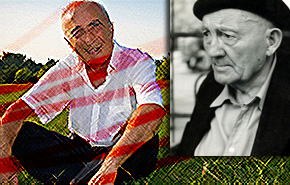Page 1 Page 2 Page 3 Page 4 Page 5

There was a man whose memories of happy moments could be counted on one hand. Food always tasted strangely to him; even his mother’s milk had been slightly off. As a child, he saw nothing pleasant in nature, full as it was of bumblebees, honking geese, and the heartbreaking loneliness of buzzing cicadas. Childish play was a daily exercise in humiliation, intimidation, and defeat. There was something under his bed.
His parents loved him, no doubt, but his father frightened him and his mother carried a small tumbler from which she sipped; and as each day wound its uncertain way to the fall of night, her speech became an unknown language and her eyes focused on something he could not see. Rarely could he summon the courage to speak to them at all; how could he tell them about the thing under the bed that tormented his nights?
As he grew apart from infanthood, he knew the truth about the things he feared, but still they chilled his skin or clawed at his bare ankle. The faded, timorous schoolteacher who lovingly showed him the infinity of space and the intolerable size of stars merely introduced another torment into his life; in the night, he turned his eyes from the terrible heavens. Pain in any form was unbearable, yet already the knowledge that at the end of everything lay the ultimate agony made a yellow horror of life itself.
He was often ill with some unnamable ailment, and when thus confined, he could think of nothing to do. He read with difficulty an occasional book, but the stories bore no relationship to reality. He could not escape into fantasy or contrived adventure in the manner of other boys; instead he searched in the grainy pages for a fellow soul who found life as sad and difficult as he did, but he could not locate him. Finally, he knew that he was all alone.
Occasional friendships were pleasant, but always a close friend would unaccountably turn against him, and the taunting of a former friend was worse than if he had no friend at all. His childish trust withered, and a thin protective layer began to form around him.
The coming of puberty added yet another dimension of embarrassment and frustration to his troubled existence. When he shipped out into that uncharted sea, all his days unsettled and lacking in landmarks, he could not tell the difference between his own yearnings and his envy of the imagined or embellished exploits of his more mature classmates. But one evening, at a semi-frenzied gathering of similarly hormone-ridden former children, he sat squirming on a seat of fire as before him a tiny damsel named Tammy showed off her new endowments, whirling and pounding in a dance that burned his eyes like a hot medieval iron. Everything she wore clung tightly to her shapely little figure, and her every feature was painfully perfect. As she whirled and pulsed in the dim lights from the table lamps, and her shadows flickered in their own dance up and down the aching walls, and her long, dark hair swung wildly outward and then leaped to cling to her adorable body, his eyes were drawn against his will to the way her pelvis tipped forward, thrusting her rear out and pulling her lower abdomen in, in, in. He looked away, but as if an optical electromagnet were embedded there his tortured gaze returned to the buried place where the lines of her flanks, her tipped abdomen, her entire body, in fact, were joined and focused. He was being pulled there helplessly, as if trapped in a wind tunnel, drawn in torment into that glorious hollow where all the lines of her flanks and her tipped belly were pointing like arrows. At that moment of revelation, he was introduced to a desire separate from the boyish boasting of anyone else, desire so overwhelming that it was to taint and dominate the rest of his life.
Overwhelmed in that shadowed dance, abruptly he escaped to the fresh air of the frog-haunted night, his face contorted with pain. A plain, plump girl, who loved and watched him unknown, followed him outside.
“Elliot,” she murmured, “are you sick?”
Unable to rearrange his tortured features or to speak without tears, he gestured repeatedly toward the lights, appealing to her to understand.
“What is it, Elliot? What happened?”
“Tammy,” he gasped, “she’s — she’s so — “
“What? What did she do?”
“No. It’s — she — she’s — ” But he was fourteen, and there were no words for it.
Inside, the plump girl explained his absence. “He’s outside,” she told her friends. “I think he’s mad at Tammy.”
As he watched the rotating figures through the window, he saw her for a moment in the arms of a handsome classmate, pressing that forbidden abdomen against his body. With a final groan, he turned with tightened eyes and walked away, leaving behind him the music and the happy laughter, until he could hear only the tree frogs peeping in the humid night.
After that, he retreated to a simpler time, when his only pain stemmed from clumsiness and solitude. Alone, he fished and hiked and rode his bicycle, far away from the painful hollow. In school, he sat in front of each class, so as not to see the nubile backs, the swaying hair, the obscenely swollen profiles. The curtain he drew over himself was clear to everyone, and his solitude remained unchallenged. He reached a state of gloomy equilibrium.

